Updated: December 23, 2019
I have been using Firefox for roughly fifteen years, give or take. During that period, I've seen it grow into a beautiful project, become a world of wonderful extensions, and then slowly shrink and fade as it did what the competitors do, losing the core advantages it had in the first place. Despite all that, it remains my primary browser. And if you're asking me - well, you should - it ought to be yours, too.
In this article, I will tell you why. It goes beyond the everyday stuff like memory consumption, the extra three milliseconds of browser launch, or how pretty the application may look on a phone. It's about choice, the freedom of choice, and the critical importance of competition. As a nerd reading this article, you have a moral obligation to be part of that equation. Follow me.
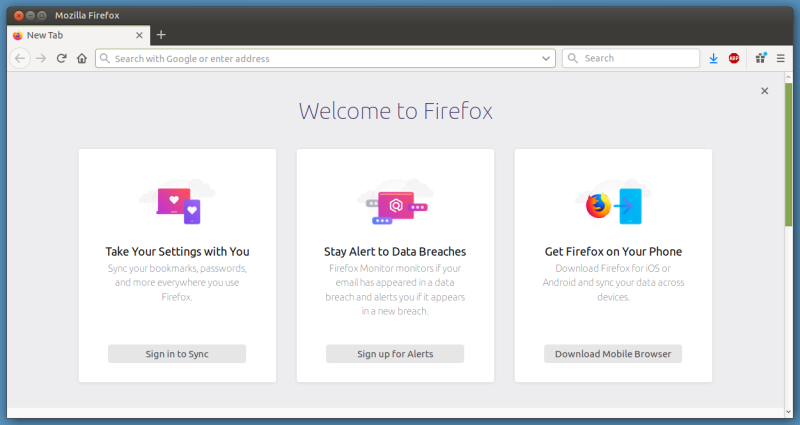
The background story
You don't need me telling you about market share numbers. Firefox is no longer the darling browser of the tech world. That title has been usurped by Google Chrome. Indeed, with Chrome dominating the market, especially the browser space, we're seeing more and more focus on and around it. We've come to the point where Web developers are now coding their sites with Chrome-only clauses, much like they used to do with Internet Explorer back in the mid-2000s. Dark times back then, dark times now.
Side by side with the lack of competition - which isn't good for anyone, as it stifles innovation and choice, on a personal level, recently, I spent a lot of time a-travelin' for conferences and such, bewoe the spotlight, and this necessitated interacting with technology in ways that go beyond my cold, calculated efficiency. So I ended up using Firefox, Chrome and some other browsers in all sorts of environments, across all sorts of networks, with VPN and without, streaming, screen sharing, video conferencing, and so forth. Some of it happened on the desktop, some of it on the mobile. The experience reinforced what I've always believed and preached:
Firefox is the least annoying browser of them all.
It's impossible to say it's awesome, but it sure is better (or less bad) than the rest. On many levels. And so, in this article, I want to tell all about why Firefox ought to be your primary browser, and why you should be deeply, deeply concerned about its market share.
Privacy as the main selling point
This has become more and more important lately, as people begin to realize that their data is being used, misused and abused at wild abandon. Worse than that, even companies that have no intent on monetizing personal data quite often don't have the tools and expertise to keep that data safe, so you end up with your information scattered all over the Internet.
There's been a lot of nonsense in this space - new tab stories and snippets, Pocket and the rest, but I guess Mozilla is slowly coming to the realization that the world is turning against aggressive, in-yer-face marketing, and they are in a good position to shift their angle and pitch a more benevolent story. Thus, when it comes to minimizing your exposure to the Internet bullshit, Firefox does the most reasonable job in the browsersphere.
- Adblocking in Firefox is (currently) not affected by the Manifest V3. So if you want a carefree browsing experience, without having to wonder if and when your extensions may stop working as intended, Firefox is probably the safest bet at the moment.
- You also get extensive tracking protection. There are multiple levels: standard, strict and custom. The default one will block some third-party cookies and pesky Web elements, and you will also get a notification when the browser kicks in action. With strict, all third-party content will be blocked, which could lead to some broken sites (good, perhaps). Finally, you can tweak you desired level through Custom settings.
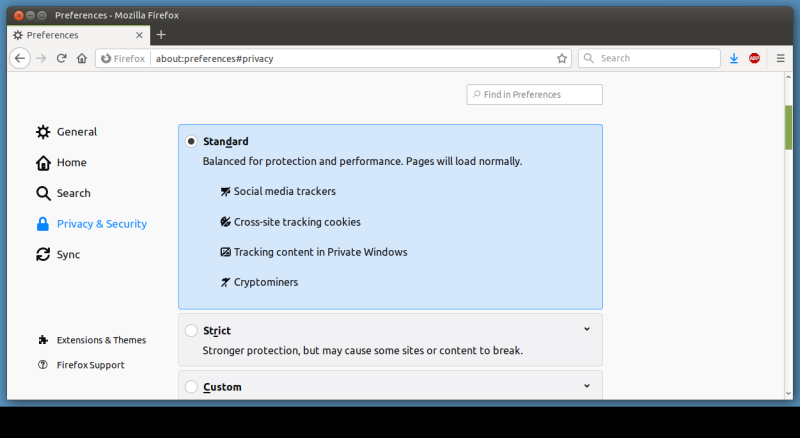
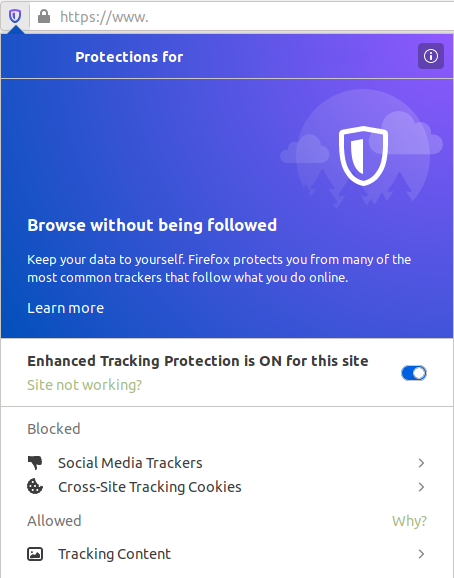
- You can disable WebRTC. This is particularly important for people using VPN. In about:config, search for the following key, and set it to False.
media.peerconnection.enabled
Security
Well, this is a contentious one. But a simple one for me. Overall, Firefox is fairly secure and robust. Is it better than competitors? I don't know. Then again, I think the whole security deal is overrated. However, for many years, Firefox users had an advantage over all other browsers - the fabulous Noscript Security Suite. This amazing little extension simply blocks Javascript (and other elements) from loading, allows you per-site whitelisting and exclusions, and also comes with cross-site scripting protection. Cushty.
While the security angle is typically pitched as the most important one (in this section, it fits), the side effect is a clean, fast, intrusion-free browsing experience. Some sites don't really work without Javascript, but then, in most cases, those aren't really sites you want to be visiting in the first place. Unless there's interaction and persistence, scripts shouldn't really be used. Well, we can't fix the Web, but we can sure make the browser behave as we like, and here Firefox reigns majestic. Very recently, Noscript has also become available for Chrome, emphasizing the importance of this functionality.

One other thing that come to mind is DNS over HTTPS (DoH). I thoroughly dislike this concept, at least for trusted networks, like your home setup, where your ISP does the whole DNS thingie. The reasons are many. First, browsers should obey and respect the system network configuration. Second, how does moving DNS from your ISP to a cloud provider (even if the provider may be reputable) change things? Third, it's another non-problem suddenly portrayed as a big catastrophic deal - a solution that needs a problem.
Anyway, in Firefox, this settings can be easily changed through the standard Preferences/Options menu. Other browsers have different implementations, currently less visible or flexible. As long as there's choice, or even a sweet illusion of choice, it's better than the alternatives.

Firefox on mobile
Speaking of adblocking, you can use add-ons in Firefox Mobile, too, including those that block annoying nonsense on the Web. For example, I use Adblock Plus in Firefox on my Motorola Moto G6 phone, and the browsing experience is neat and quiet and fast. And you have the full range of add-ons available, so it's not just around privacy or security. Lots of convenience, too.

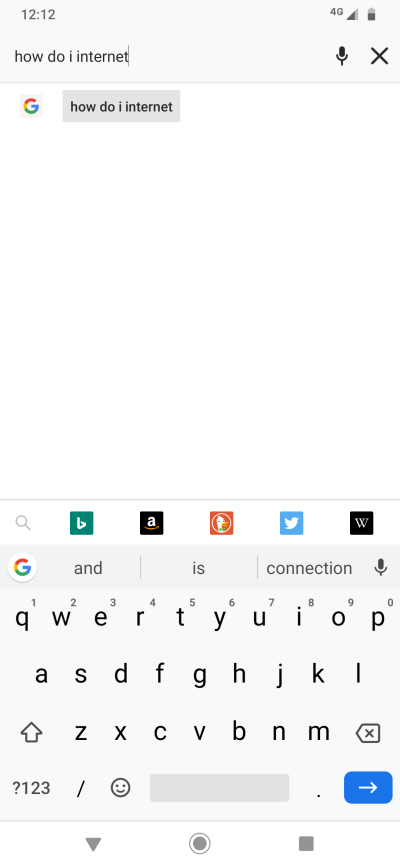
Customization
Despite all that's happened, Firefox still remains quite customizable and configurable. The veterans will find the new world restricted, of course, myself included, but if you glance across the Internet desert, in my not so humble opinion, Firefox offers the highest degree of freedom to tweak the browser settings and adjust its behavior to the user's needs.
As a specific example, just recently in Chrome, I discovered that since version 78, there's no more flag to enable the full URL in the address bar. This was possible using a flag. Not anymore. Instead, one must manually edit the JSON-formatted LocalState file in the Chrome's user profile, and add overrides that show the full URL in the address bar - and this doesn't work in version 79! In Firefox, this option remains part of the browser config - including the highlight of the domain name.
browser.urlbar.trimURLs
browser.urlbar.formatting.enabled
Then, I've also shown you, as part of my Plasma desktop & scaling experience, how to change the size of the UI elements, the browser is your oyster, provided you're comfortable with some lightweight CSS editing, we talked about how to make pinned tabs wider, and so forth. You still have the almost full range of options at your disposal. Compared to what Firefox did back before Quantum, this is a much more limited set, a good reason to be sad and angry, but it's still way ahead of the competition, a good reason to be ever so slightly less annoyed.

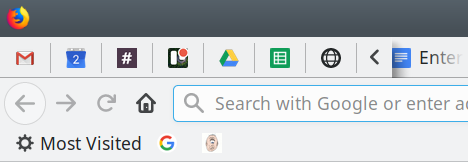
Conclusion
I have outlined a bunch of things in this article. Jolly good. But now, if you step back and think about it, these are 100% irrelevant to the vast majority of people. Maybe one or two innocent souls will blink at the notion of privacy. By and large, people would eat mercury by the spoonful if it gave them free stuffs on the Internetz. So yes, Firefox has quite a few technical advantages over its rivals, and it is the most flexible browser out there. But that's not the chief reason why you should be using it.
The main thing, the truly one real main thing - we need competition. If Firefox disappears, the world goes back to the Internet Explorer 6 era. It was a dark time. And it has nothing to do with Chrome as a product. It has everything to do with the ecosystem, the mindset, the way people behave. We already have lazy developers coding Chrome-only sites. If and when Firefox vanishes, the Internet will become a zombieland. Innovation and freedom are already quite low across the board, and when there's no survival incentive, we will find ourselves deep in intellectual stagnation that can take decades to fix. If ever. We need Intel and AMD, we need Windows and Linux, and we need Chrome and Firefox.
Of course, swaying techies with emotion doesn't really work. But emotion plus actual technical benefits and advantages ought to do it. I believe that Firefox has the necessary clout. It's flexible, customizable, with features you don't really see elsewhere. What remains is the message. Just like in 2004, when people had hope and optimism when Firefox emerged, offering something new and fresh. Now though, the message is less optimistic, less shiny, but a hundred times more important. Because Firefox today is all about the Internet ten years from now.
Cheers.